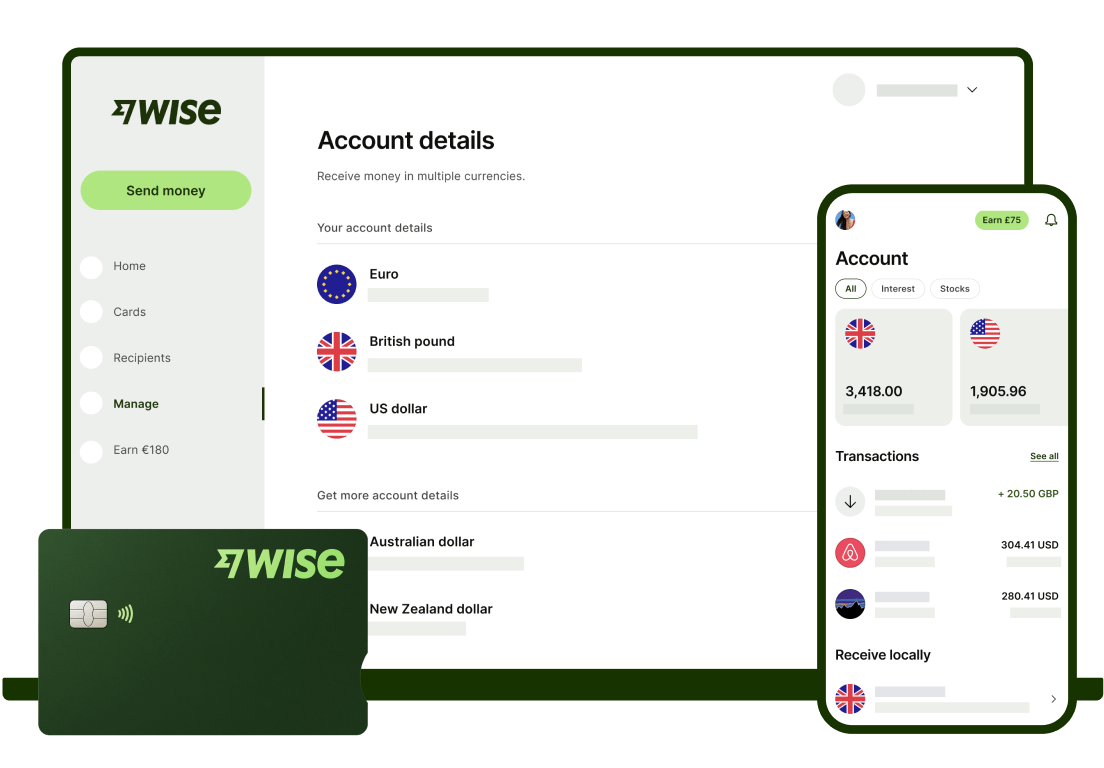Counting up vs Tide: Comparison for UK Businesses
Read our review of CountingUp vs. Tide for UK businesses, comparing fees, features, security and more.

Known as the economic powerhouse of Europe, Germany is a fantastic place to start a new business. It’s home to a huge number of startups and SMEs, attracted by the country’s highly skilled, creative and hardworking workforce. And of course, it’s strong strategic location in the heart of Europe.
If you’re excited to get your new business off the ground, one of the first things you’ll need is a business bank account in Germany.
In this guide, we’ll show you exactly how to get your new account open. This includes info on banks in Germany, the documents you’ll need and what costs are involved.
We’ll also show you a non-bank alternative such as Wise Business, which lets you effortlessly manage your business finances across 40+ currencies, including GBP and EUR.
💡 Learn more about Wise Business
The process for opening a bank account in Germany varies between banks. Some will let you at least start the process online, but it’s likely that you’ll need to visit a branch in person at some point.
This may be to verify your identity or to sign documents relating to the account. However, some banks in Germany use systems such as PostIdent and VideoIdent to verify identity without the applicant needing to be physically present at the bank.¹
You’ll need to provide supporting documents as part of your application, which we’ll run through in just a moment.
The requirements for opening a business account in Germany vary depending on your company type. Sole proprietorships may only need to provide proof of identity, while corporations need additional documents such as:¹
- Articles of association
- List of shareholders
- Certificates of incorporation
- Proof the company has been registered in the _Handelsregister _(commercial register)
- Trade licence (if applicable)
- Details of the company’s registered address
For the specifics of what you’ll need for your business, it’s best to contact the bank directly.

Germany has a large number of banks, and many offer business accounts.
But to give you a place to start your research, here are a handful of the biggest and most popular banks offering accounts to business customers.
The largest bank in Germany, and one of the biggest in the world, Deutsche Bank
Part of UniCredit Bank AG, HypoVereinsbank offers a HVB BusinessKonto 4You account which can be opened and managed digitally.
Another of Germany’s leading banks, Commerzbank offers tailored solutions for businesses. Its services include business accounts, integrated payment solutions and POS systems. You’ll need to make an appointment to discuss your options.
Owned by Deutsche Bank, Postbank serves millions of customers in Germany and has a wide network of branches countrywide. For businesses, it offers a choice of accounts including the flexible Postbank Business Giro Active account.
This is the collective name for the company which runs a number of the banking cooperatives and credit unions in Germany, which operate under the Volksbanken und Raiffeisenbanken umbrella.
It offers services for businesses, including a straightforward business account.
BerlinerSparkasse is one of the most popular savings banks known as Sparkassen in Germany. They’re held by public shareholders, usually cities or communities.
For businesses, the bank has a range of options to suit companies of different sizes. This includes FirmenKonto pur, a straightforward, entry-level account with low fees.
Of course, a bank isn’t the only option for managing your business finances across international borders. In fact, it could be easier and cheaper to go with a non-bank alternative such as Wise Business.

Open a Wise Business account online and you can manage your company’s finances in 40+ currencies, including GBP and EUR. You can send, receive, convert and hold money in euros or whatever currency you need to, making it the ideal solution for globally trading businesses.
You’ll be able to pay suppliers and staff in their own currency, and cover business expenses with Wise Business cards - which work in 150+ countries including Germany and the EU.
Wise Business is bursting with useful time and money-saving features for companies of all sizes. These include a clever batch payment tool, payment automation and integration with your accounting tools.
Wise payments are fast and fully secure (even for large amounts). Best of all, you’ll only pay low, transparent fees and always get the mid-market exchange rate.
Get started with Wise Business 🚀
Still have questions about getting your new company account open? Read on for the answers to some of the most commonly asked questions.
It may be possible to open a bank account in Germany if you don’t live there (i.e. you’re still living in the UK). But you’re likely to need a residential address in Germany in order to start your business, as well as to apply for a business bank account. You’ll need to consult your chosen bank to find out their requirements.
If you have no luck with traditional banks, you can look into getting a digital business bank account in Germany, or a non-bank account.
Business bank accounts in Germany can be opened in as little as 2 days, but it could take longer.
It all depends on the bank, account and entity type of your business, as corporations will have many more documents to check. Accounts for sole proprietorships, on the other hand, can be opened with just photo ID.
It’s relatively straightforward to open a business bank account in Germany, but only if you have your documents in order. Many banks have English-speaking customer service representatives, but you may encounter some documents and processes in German.
You may find it difficult to open a bank account in Germany for a wholly UK-based business. However, it may be possible if your UK company has a branch, subsidiary or other operations in Germany, and you have a registered address there.
If your business is a limited liability company, it’s a legal requirement to have a business bank account.¹
Sole proprietors may be able to use a personal bank account, but it’s not recommended. Separating personal and business finances is essential for accounting, tax and transparency purposes.
Looking for a different way to manage your international company’s finances?
Check out Wise Business, a smart way to manage business payments in euros and pounds, with flexible, low cost multi-currency accounts.

Wise Business accounts support EUR and GBP, with options to hold and exchange a total of 40+ currencies for low fees.
What’s more, you’re guaranteed the mid-market exchange rate on all currency conversions. This is the rate that banks use to buy and sell currency, and is widely considered the fairest rate you can get.
You’ll get local bank details for GBP, EUR and a selection of other major currencies. You can use these to get paid by customers, or through PSPs like Stripe and marketplaces like Amazon.
With Wise Business, you can send money to 160+ countries globally. You’ll also get business friendly features like linked debit and expense cards, multi-user access, batch payment tools and cloud accounting integrations.
You can even automate payments using the powerful Wise API to save even more time. See how it works here in our case study
Here’s how to register a Wise Business account in just a few simple steps:
Get started with Wise Business 🚀
After reading this, you should be all set to start researching German banks and getting your application documents together.
Once you’ve found the right business account, you should find it relatively straightforward to apply - just make sure you have all your paperwork in order before starting.
The best of luck with your new venture in Germany!
Sources used:
Sources last checked on date: 21-June-2024
*Please see terms of use and product availability for your region or visit Wise fees and pricing for the most up to date pricing and fee information.
This publication is provided for general information purposes and does not constitute legal, tax or other professional advice from Wise Payments Limited or its subsidiaries and its affiliates, and it is not intended as a substitute for obtaining advice from a financial advisor or any other professional.
We make no representations, warranties or guarantees, whether expressed or implied, that the content in the publication is accurate, complete or up to date.

Read our review of CountingUp vs. Tide for UK businesses, comparing fees, features, security and more.

Read our essential guide on how to open an Airwallex account in the UK, including what documents you’ll need and step-by-step instructions.

Read our comprehensive Airwallex business account review for UK companies, including features, fees and more.

Read our handy guide on how to close an account with Airwallex, including step-by-step instructions for starting the process.

Read our guide to the best business bank accounts for limited companies in the UK, including Tide, HSBC, Santander, NatWest, Starling and Barclays.

Check our ANNA Business account review. We cover features, fees, FAQs and all the information you may need to choose your business account.